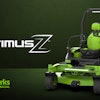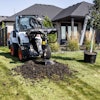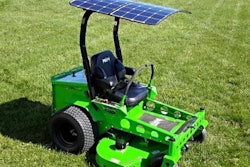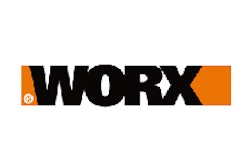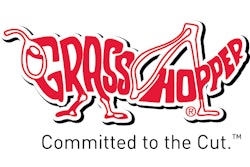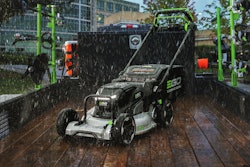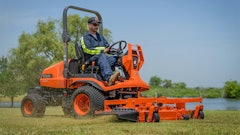New technologies and the use of alternative fuels have made it easier for landscape contractors to make more sustainable choices when it comes to their truck and equipment fleets. However, no single approach will fit all property and contractor needs.
The demand on manufacturers is to provide products with increased fuel economy, reduced emissions and lower noise—without sacrificing performance or safety. They have responded by developing products that meet increasingly stringent EPA requirements and local ordinance restrictions.
Roger Phelps, Stihl’s promotional and communications manager, says that equipment manufacturers offer a broad selection of technology, giving customers optimum performance and sustainable options. “If you look at our handheld lineup, for instance, you will find two-cycle, hybrid four-cycle, plug-in electric and battery-powered products,” Phelps points out. “There’s an application for each of them.”
Here’s a look at some new technologies and alternative fuels that are growing in popularity among landscape contractors.
Propane
Twelve mower manufacturers now offer at last one propane model. A company called Lehr even offers propane-powered handheld equipment and push mowers.
“Propane is a recognized alternative fuel,” explains Brian Feehan, vice president of the Propane Education and Research Council. “Roughly 90% of it is derived right here in the U.S. where it is a natural byproduct of natural gas and oil.”
Feehan talks about some of the benefits of using propane. “In addition to reducing greenhouse gasses and carbon monoxide emissions, propane is competitively priced with other fuels, and it is used in a closed loop, meaning operators are not likely to spill it like they can gasoline or diesel fuel. Two 8-gallon cylinders on a mower will deliver 10-plus hours of run time, and there is no degradation in performance; propane has an octane rating of 105.”
Feehan emphasizes that since 14.5 million on-road vehicles worldwide operate on propane, including about 270,000 here in the U.S., and adding to that the 670,000 propane forklifts in the United States alone, propane is readily available at dealer locations throughout the country, and it can be delivered right on site. The biggest challenge to usage growth is education, he adds.
Battery
Phelps says that Stihl’s new battery-powered products feature 36-volt Lithium-Ion batteries that don’t have memory or brownout issues, making them ideal for professional applications, such as maintaining roof gardens where fuel isn’t allowed and electrical outlets are not necessarily accessible.
More professional landscape contractors are finding ways to use battery-powered equipment on everyday jobsites. Nick Militello and his father Tim of Eco Green Lawn & Tree Co. in Las Vegas, NV, and Mik and Jodi Beetham of Green Energy Lawn Care in Chapel Hill, NC, represent a new wave of green companies in the lawn maintenance business. Both are avid users of WORX equipment, including trimmers and edgers, blower vacs and even push mowers.
Cleaner Traditional Fuels
Contractors don’t have to rely on battery technology or alternative fuels to be in line with sustainability initiatives, either. “Traditional fuels such as gas and diesel are much cleaner today than they were a few years ago,” says Ray Garvey, marketing coordinator for Grasshopper. “In fact, since 2004, diesel fuel has realized a 99% reduction in black carbon emissions and has improved considerably in terms of particulate emissions.
“Drop for drop, today’s diesel fuel delivers 15% more power than gas and 40% more power than LP, which ultimately leads to less fuel consumption, fewer emissions and greater productivity,” Garvey adds.
When used in conjunction with Grasshopper MaxTorque Clean Diesel Technology, Garvey says diesel fuel provides a great value for contractors who want to operate in a more sustainable way but still maintain a high level of productivity. “If the technology doesn’t ultimately reduce costs or increase productivity, it probably won’t pan out as a sustainable business practice,” Garvey emphasizes. “In that regard, clean diesel coupled with MaxTorque technology is an excellent alternative for landscapers.”
“The technology is there to reduce engine emissions, improve fuel economy, reduce noise and accommodate alternative fuels,” Phelps points out. “The key is to do this affordably and without sacrificing performance. It’s then up to individual users to select the technology best suited to their applications.”

